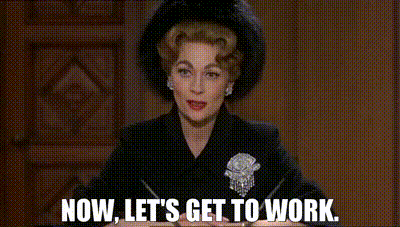At the risk of sounding particularly annoying, I think we've lost the plot on work. Somewhere between the girlboss era's spectacular collapse and the rise of "I don't dream of labor" as a lifestyle brand, progressive spaces have overcorrected. Ambition has become suspect. Wanting things, wanting to get better at things, has been flattened into a betrayal of values.
The backlash to hustle culture was justified. Sheryl Sandberg's Lean In told women to work harder within a system designed to exploit them. The girlboss promised empowerment and delivered burnout. When Kim Kardashian said "nobody wants to work these days," she became a perfect avatar for out-of-touch wealth. The response—rest culture, anti-work memes, the romanticization of doing nothing—made sense as a corrective.

But it's hardened into something else. I've watched it happen in real time: I'll be in conversation with other queer people, mention my future goals, things that honestly boil down to wanting it all (and yes, a Birkin to match—I'm disgustingly obsessed with Hermès, add it to the list of things I'm working through in therapy), and I'm met with something between horror and pity. Like I've revealed myself to be a three-headed, status-obsessed monster. Like wanting things makes me less progressive than I seemed. There's an assumption in those moments that ambition itself is the problem. A performance of being checked out, uninterested in advancing or building skills. Focused on merely existing.
And I understand where it comes from. Forty-four percent of Americans reported trouble affording medical care in May 2025, a number likely to worsen with Trump’s Big Beautiful Bill. Homeownership is a fantasy for most people under 40. Layoffs continue to surge across industries. When the system feels this rigged, when progress seems impossible, why try?
Here's why: because that resignation is exactly what the system wants.

The sociology of work is complicated. Marx saw work as something deeply human—a way we shape the world and express ourselves. But under capitalism, he argued, work becomes alienating: we're cut off from the things we make, the process of making them, and even from ourselves. Instead of being creative or fulfilling, work turns into survival and exploitation, designed to generate profit for someone else.
Feminist theorist Kathi Weeks takes this further in The Problem with Work. She argues that rejecting work, opting out, resting, refusing the grind, can itself be a form of resistance to capitalism. And she's right, to a point. The refusal matters. But what I see now is an overcorrection: the refusal has hardened into a posture where ambition itself is treated with suspicion, where wanting to be good at something feels like complicity.
Here's what gets lost in that: growth requires work. Evolution requires work. Getting better at anything, whether it's writing or cooking or organizing your community or being a better partner, requires effort and intention. That's not a capitalist construct. That's just how skill and craft operate. The question isn't whether we should work. It's what we're working toward and who benefits from that labor.

Social media has accelerated the confusion. There's a performance happening, a kind of competitive disengagement where caring too much about anything makes you uncool. People parrot anti-work rhetoric without examining what they actually need. It's easier to post "I don't dream of labor" than to ask: what do I dream of? What do I want to build or learn or become, separate from whether it pays?
Also, for what it’s worth, I think it’s perfectly ok to dream of labor. I’m right there with you, obsessively dreaming, planning, and strategizing labor.
Marx suggested we need to reclaim labor to liberate ourselves. I don't disagree. But I think the reclamation has been misconstrued. It's not about rejecting all ambition or refusing to invest in our own growth. It's about divorcing those things from capitalism's logic. It's about building a life where you're trying to get better at something because it matters to you, not because it serves a system designed to extract value from you.
The girlboss era didn't help. In the mid-2010s, Sheryl Sandberg's Lean In and Sophia Amoruso's #Girlboss told women to tighten up, push harder, become ruthlessly ambitious. The advice wasn't objectively bad on its surface—women remain underrepresented at every stage of the corporate pipeline, and the data worsens when we look at women of color, who represent only 7 percent of current C-suite positions, just a four-percentage-point increase since 2017. The problem was where that ambition was supposed to go: into corporate structures that were never designed for us, that demanded we break ourselves to succeed.

That version of ambition was toxic. It asked us to sacrifice everything—our health, our relationships, our sanity—for a corner office and a seat at a table we should've been flipping. It tied our worth to productivity, to how much we could endure, to whether we could "have it all" without complaining. It was ambition in service of capitalism, not in service of ourselves.
But here's what I think is worth keeping: the idea that wanting things isn't inherently bad. That aspiration, the desire to excel, to be recognized for what you do, doesn't make you a sellout. The mistake was in thinking that ambition could only look one way—corporate, hierarchical, tied to wealth and status. We threw out the concept entirely instead of reimagining what it could mean outside those structures.
What if ambition looked like artistic integrity? Like a mixologist spending hours researching spirit flavor profiles not for tips or recognition, but because they love understanding how flavors work together? What if it looked like a parent learning to be more emotionally available with their kids, doing the hard work of unlearning patterns and showing up differently? That's ambition too—the deliberate pursuit of growth in something that matters. What if it looked like getting really good at organizing your community, or perfecting a specific technique in your craft, or building something with your hands that didn't exist before?

I think there's real freedom in divorcing work from capitalism, even when we're still trapped inside its structure. For me, that's meant treating what I do on my website as work. I carve out time in my schedule, dedicate hours to research and writing. It's work to me, and I treat it with the same seriousness I bring to things that provide monetary value, even though it doesn't. I want to be known for something, and for now, I want it to be this. That requires work. Ask any of my closest friends and I've said "I'm working on this article" or "Sorry, can't meet your friend's new metamour, I've got work!"—which, thank god I do have this, because I've also conveniently had enough of metamours.
This mixologist I know operates the same way. They spend hours researching spirits, understanding how flavor profiles shift across seasons, what batch might be optimal for a particular cocktail. There's no annual review for this. No standardized path to success. Just a tremendous amount of effort because they really fucking love their industry and find passion in it.
I think about teachers who experiment with new ways to engage students, not because it'll get them a promotion, but because they care about the craft of teaching. People learning languages through free apps on their commute because they want to connect with their grandmother. Someone who's mindfully spending and follows YouTube workouts because they want to feel strong. Hannah Einbinder's character Ava in Hacks—a deranged bisexual willing to subsidize $72 branzino to get ahead. That unapologetic hunger for something more.

Which brings me to something uncomfortable but necessary: to some extent, we need more queer people making money. Not for accumulation or to join the ranks of wealth hoarders, but to invest it back into our communities. To fund queer artists. To support queer business owners. To build infrastructure that doesn't rely on straight benevolence or corporate rainbow-washing. Economic power, when directed intentionally, can be a form of care. But that requires some of us to pursue financial success unapologetically.
I'm aware of my privilege here. I have a white-collar job that affords me time and financial stability to invest in creative work at a loss. I can dedicate hours to writing without needing it to pay my rent. I can learn at a deficit. Not everyone has that margin, and I'm not pretending this framework works universally.
But the principle scales. It's not about committing five hours a week or having disposable income. It's about having something you're trying to get better at because it's yours. Fifteen minutes before bed learning guitar. Free library books on a subject you're curious about. Drawing. Cooking. Learning a language during your commute. The point isn't the amount of time or money. It's that you're showing up for yourself in a world that wants you to believe you don't deserve to.

So what does this actually look like in practice?
Start with goal planning, but not the corporate kind. Ask yourself: what do I want? Not career milestones. Life things. Do you want to feel empowered by what you're making? Secure in your relationships? Comfortable in your body? Knowledgeable about something that fascinates you? Work backward from there. How do you make that real in your schedule?
Pick one thing you want to get better at. Just for you. Something that aligns with your values, whatever they may be. Then carve out whatever time you actually have. Maybe it's fifteen minutes a day. Maybe it's an hour on Sundays. The amount doesn't matter. What matters is that you're showing up.
Talk to friends about strategy. Be unapologetic about it. Drop the fear of judgment, the performance of not caring, the idea that ambition makes you complicit. Less time performing cool disengagement on the internet, more time wandering museums or parks or reading books from the library. More time building something that's yours.

Here's what I want you to understand: you're allowed to want things. You're allowed to care about getting good at something. You're allowed to have ambition that exists completely separate from whether it makes you money or advances your career or looks impressive to anyone else. Capitalism has tried to convince you that all work serves extraction, and rest culture has tried to convince you that all ambition serves capitalism. Both are wrong.
We can't let capitalism shrink our joy or our sense of possibility. Reclaiming work from capital isn't about opting out entirely. It's about investing in ourselves, in our communities, in the things we want to get good at—regardless of whether they're profitable. That's the resistance. Not checking out. Not pretending we don't care. But caring deeply, deliberately, about something that's ours.
Like what I have to say? Support me and subscribe to my newsletter.


.png)







